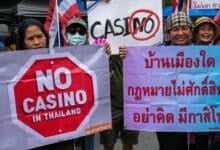Thailand greenlights legal casinos to boost tourism and economy

In a game-changing move, the Thai Cabinet has given the nod to a draft bill that would legalise gambling and casinos, aiming to turbocharge tourism, job creation, and investment.
Prime Minister Paetongtarn Shinawatra announced the bold move today, January 13, heralding a new era for the country’s economy.
Under the government’s ambitious plan, the legislation, soon to be debated in Parliament, will allow gambling in sprawling entertainment complexes.
While casinos and most types of gambling are currently banned in Thailand, illegal betting on football and underground lotteries flourish, with millions involved in the black market. Currently, legal gambling is limited to state-controlled horse races and the official lottery.
Unlike its neighbours, Cambodia, Singapore, the Philippines, Laos, and Myanmar, Thailand has yet to tap into the lucrative casino market.
The government argues that the lack of legal casinos means missing out on potential revenue and not fully capitalising on the tourism sector’s potential. Tourism remains a vital pillar of Southeast Asia’s second-largest economy, with Thailand anticipating record visitor arrivals in the coming years, said the 38 year old Thai prime minister.
“Legalisation will protect the public and also generate more state revenue.”
Though previous attempts to regulate gambling have been met with resistance from conservatives in the predominantly Buddhist nation, the latest proposal hopes to overcome these hurdles.
Deputy Finance Minister Julapun Amornvivat shared optimistic forecasts, predicting that the legalisation could spur a 5% to 10% increase in foreign visitors and boost tourism revenue by approximately 120 billion to 220 billion baht. Additionally, the initiative could create between 9,000 and 15,000 new jobs, reported Bangkok Post.
A staunch advocate of legalising gambling is billionaire ex-premier Thaksin Shinawatra, the PM’s father, who remains a powerful influence within the ruling party.
As Thailand rolls the dice on this daring economic strategy, it aims to turn the tables on its rivals and emerge as a key player in the regional tourism sweepstakes.
Latest Thailand News
Follow The Thaiger on Google News:


























